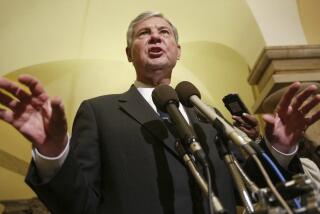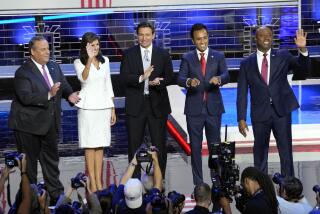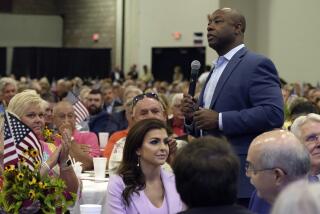Florida Straw Poll Gives Dole a Narrow Victory : Politics: He wins 33% of the vote by GOP activists. Sen. Phil Gramm gets a boost with strong second-place finish.
- Share via
ORLANDO, Fla. — Senate Majority Leader Bob Dole battled to a surprisingly narrow victory in a closely watched presidential straw poll of GOP activists here Saturday as Sen. Phil Gramm of Texas scored a strong second-place finish that could invigorate his campaign.
Former Tennessee Gov. Lamar Alexander, who campaigned heavily in the contest, finished close behind Gramm in a tenacious battle for the second spot.
The tight finish among the top three in balloting by nearly 3,400 Florida Republicans left each campaign declaring success. Gramm claimed credit for finishing close to Dole; so too did Alexander claim advantage for finishing near Gramm.
For its part, Dole’s camp declared success by a more straightforward measure: He finished first, even if his margin of victory was less than many had expected.
“A win is a win, and today was a win,” said Scott Reed, Dole’s campaign manager.
The straw poll was purely symbolic: No delegates to next year’s Republican National Convention were at stake. But as the last major confrontation between the candidates before actual voting begins February in Louisiana, Iowa and New Hampshire, the contest attracted huge resources of time and money from the three leading finishers.
In the final results, Dole won 33% of the vote, followed by Gramm with 26% and Alexander with 23%.
Conservative commentator Patrick J. Buchanan, who did not launch the extensive effort to woo delegates that the top three did, lagged with 9%. He was followed closely by former State Department official Alan Keyes, who attracted 8%. Keyes’ showing apparently was helped by a passionate speech he delivered that stressed cultural conservatism.
Three other candidates--publishing magnate Malcolm S. (Steve) Forbes Jr., Rep. Robert K. Dornan of Garden Grove and Indiana Sen. Richard G. Lugar--each garnered less than 1% of the vote.
For Dole, the victory was important mostly because it eliminated another hurdle he must clear to protect his lead in the polls. “Dole is passing the mile markers and not bleeding,” said Ronald Kaufman, who served as White House political director under President George Bush.
But Dole’s ability to attract just one-third of the vote in a contest where he spent lavishly--by some estimates, at least $800,000--gave new hope to his rivals that his support is thinner than his lofty lead in national surveys suggests.
“I think it’s a problem for Sen. Dole,” Alexander said after the vote. “His nomination is far from inevitable. He has everything going for him and he keeps dropping.”
The result may have been most valuable for Gramm. In the past few weeks, he has been buffeted by slipping poll numbers in the critical early states of Iowa and New Hampshire.
But Gramm asserted that his finish Saturday re-established his claim as Dole’s principal rival. “We came to Florida to prove once and for all this is a two-man race,” Gramm told reporters minutes after the results were announced. “We proved it.”
Alexander and his advisers insisted the result certified him within the top tier of candidates. But despite his close proximity to Gramm in the polling, the vote was widely viewed as a disappointment to him, given that he had spent weeks crisscrossing the state to meet with delegates.
Earlier this week, Alexander’s aides openly expressed optimism that he would finish ahead of Gramm and perhaps deal the senator’s campaign a near-fatal blow in the process. Instead, Gramm argued that the results indicated that Alexander and Buchanan are “basically out of the race.”
But Dole aide Reed said Gramm’s slim advantage over Alexander showed that it was too early to say anyone had staked a clear claim to the No. 2 slot in the nominating fight.
All of these assertions may have been overheated; the results of straw polls are usually forgotten as soon as the real primary process begins. But the winners of the two previous Florida straw polls in 1979 and 1987--Ronald Reagan and Bush--both went on to win the GOP nomination.
The voting concluded a carnival-like two-day gathering held at a convention center just a few miles from Walt Disney World. The delegates cast their ballots in an old-fashioned roll call from the floor, complete with florid assertions of local pride. One county, for instance, was proudly proclaimed as the “gateway to the Florida prison system.”
Though the budget crisis in Washington kept several of the candidates away from the proceedings Friday, the leading competitors had spent weeks furiously pursuing support. The competition for votes left the delegates--most of whom were chosen by lottery in September--almost dazed by the persistent courting.
Pamela Olsen, a social conservative activist from Pinellas County, spoke with Dole and his wife, Gramm and his wife, Alexander, Keyes and Buchanan before finally settling on Gramm. Tom Landers, a high school teacher in Miami, opened his mailbox one day last week to find 21 pieces of mail from the candidates; over the last week, he’s been wined and dined in small groups that included Texas Gov. George W. Bush, Arizona Sen. John McCain and Sen. Kay Bailey Hutchison of Texas--all of whom were seeking his support for Gramm.
“When I became a delegate I was 218 pounds,” he said. “Now I’m 233.”
Before Saturday’s voting, eight of the Republican contenders delivered last-minute appeals to the delegates. Pennsylvania Sen. Arlen Specter, who has been rumored to be close to abandoning his long-shot campaign, surprised the straw poll organizers by not attending.
Like earlier confrontations between the candidates, the series of speeches underscored the extent to which their campaigns are built on converging themes of limited government, cultural renewal and a turn away from reliance on the United Nations in foreign policy.
Repeatedly, the candidates promised to eliminate the Department of Education; one after another, they denounced the U.N. and insisted they would never send U.S. troops into combat under its command. Several promised to replace the federal income tax--either with a national sales tax, in the case of Lugar, or a flat tax, as Gramm and Forbes promised.
And they competed to rouse the crowd with the sharpest barbs against President Clinton. Alexander may have won that competition when he declared that “Clinton is the first President in our history who’s felt compelled to work out his midlife crisis in public.”
In a forceful, if somewhat hurried address, Dole delivered a Reaganesque encomium to traditional values and reduced government. “Too much government is our problem,” Dole said, echoing Reagan’s 1981 inaugural address. “Returning power to the people is our solution.”
Speaking in a state where conservative Cuban Americans are a critical Republican voting bloc, Gramm pledged to “make it my No. 1 foreign policy priority to get rid of Fidel Castro. He has survived nine American presidents; but if you elect me he will not survive a 10th American President.”
More important for Gramm, on this day at least, was that his campaign produced a finish that revived his hopes of capturing the office that would allow him to follow through on that threat.
Times staff writer Maria La Ganga contributed to this story.
More to Read
Get the L.A. Times Politics newsletter
Deeply reported insights into legislation, politics and policy from Sacramento, Washington and beyond. In your inbox twice per week.
You may occasionally receive promotional content from the Los Angeles Times.










